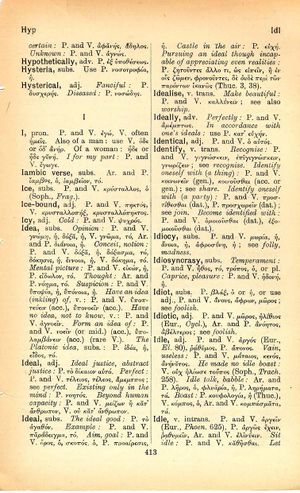idea: Difference between revisions
οὐ δικαίως θάνατον ἔχθουσιν βροτοί, ὅσπερ μέγιστον ῥῦμα τῶν πολλῶν κακῶν → unjustly men hate death, which is the greatest defence against their many ills | men are not right in hating death, which is the greatest succour from our many ills
(D_4) |
(Gf-D_4) |
||
| Line 1: | Line 1: | ||
{{Woodhouse1 | {{Woodhouse1 | ||
|Text=[[File:woodhouse_413.jpg|thumb|link= | |Text=[[File:woodhouse_413.jpg|thumb | ||
|link={{filepath:woodhouse_413.jpg}}]]'''subs.''' | |||
<b class="b2">Opinion</b>: P. and V. [[γνώμη]], ἡ, [[δόξα]], ἡ, V. [[γνῶμα]], τό, Ar. and P. [[διάνοια]], ἡ. | <b class="b2">Opinion</b>: P. and V. [[γνώμη]], ἡ, [[δόξα]], ἡ, V. [[γνῶμα]], τό, Ar. and P. [[διάνοια]], ἡ. | ||
<b class="b2">Conceit, notion</b>: P. and V. [[δόξα]], ἡ, [[δόξασμα]], τό, [[δόκησις]], ἡ, [[ἔννοια]], ἡ, V. [[δόκημα]], τό. | <b class="b2">Conceit, notion</b>: P. and V. [[δόξα]], ἡ, [[δόξασμα]], τό, [[δόκησις]], ἡ, [[ἔννοια]], ἡ, V. [[δόκημα]], τό. | ||
Revision as of 07:39, 14 August 2017
English > Greek (Woodhouse)
subs.
Opinion: P. and V. γνώμη, ἡ, δόξα, ἡ, V. γνῶμα, τό, Ar. and P. διάνοια, ἡ. Conceit, notion: P. and V. δόξα, ἡ, δόξασμα, τό, δόκησις, ἡ, ἔννοια, ἡ, V. δόκημα, τό. Mental picture: P. and V. εἰκών, ἡ, P. εἴδωλον, τό. Thought: Ar. and P. νόημα, τό. Suspicion: P. and V. ὑποψία, ἡ, ὑπόνοια, ἡ. Have an idea (inkling) of v.: P. and V. ὑποπτεύειν (acc.), ὑπονοεῖν (acc.). Have no idea, not to know, v.: P. and V. ἀγνοεῖν. Form an idea of: P. and V. νοεῖν (or mid.) (acc.), ὑπολαμβάνειν (acc.) (rare V.). The Platonic idea, subs.: P. ἰδέα, ἡ, εἶδος, τό.
Latin > English (Lewis & Short)
ĭdĕa: ae, f., = ιδέα,
I a (Platonic) idea, archetype, Sen. Ep. 58 med. (in Cic. Or. 3, 10; id. Ac. 1, 8, 30; id. Tusc. 1, 24, 58, as Greek).
Latin > French (Gaffiot 2016)
ĭdĕa,¹³ æ, f., idée [de Platon, type des choses : Sen. Ep. 58, 18 ; [Cicéron garde le mot grec ἰδέα : Cic. Ac. 1, 20 ; Tusc. 1, 58 ].

